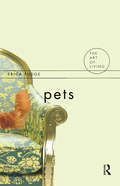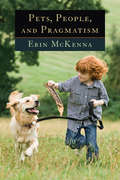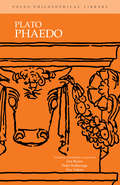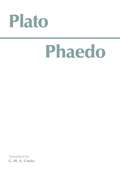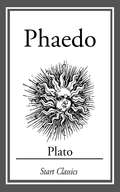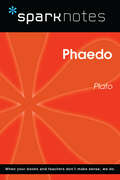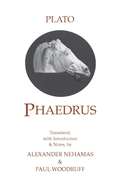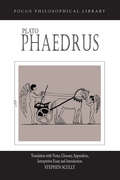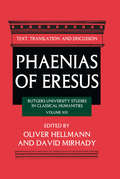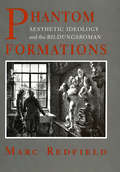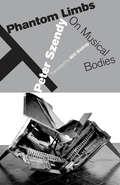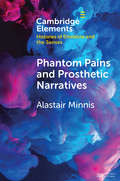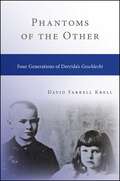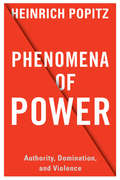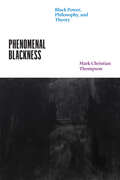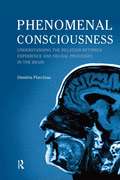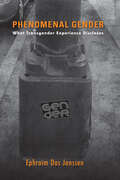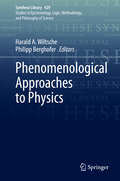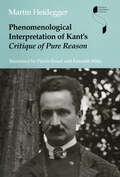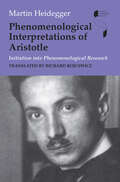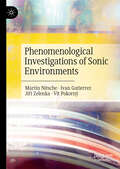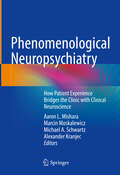- Table View
- List View
Pets (The Art of Living)
by Erica Fudge'When I play with my cat, who knows if I am not a pastime to her more than she is to me?' - Michel de Montaigne. Why do we live with pets? Is there something more to our relationship with them than simply companionship? What is it we look for in our pets and what does this say about us as human beings? In this fascinating book, Erica Fudge explores the nature of this most complex of relationships and the difficulties of knowing what it is that one is living with when one chooses to share a home with an animal. Fudge argues that our capacity for compassion and ability to live alongside others is evident in our relationships with our pets, those paradoxical creatures who give us a sense of comfort and security while simultaneously troubling the categories human and animal. For what is a pet if it isn't a fully-fledged member of the human family? This book proposes that by crossing over these boundaries pets help construct who it is we think we are. Drawing on the works of modern writers, such as J. M. Coetzee, Elizabeth Marshall Thomas and Jacques Derrida, Fudge shows how pets have been used to think with and to undermine our easy conceptions of human, animal and home. Indeed, "Pets" shows our obsession with domestic animals that reveals many of the paradoxes, contra - dictions and ambiguities of life. Living with pets provides thought-provoking perspectives on our notions of possession and mastery, mutuality and cohabitation, love and dominance. We might think of pets as simply happy, loved additions to human homes but as this captivating book reveals perhaps it is the pets that make the home and without pets perhaps we might not be the humans we think we are. For anyone who has ever wondered, like Montaigne, what their cat is thinking, it will be illuminating reading.
Pets, People, and Pragmatism (American Philosophy)
by Erin McKennaPets, People, and Pragmatism examines human relationships with pets without assuming that such relations are either benign or unnatural and to be avoided. The book addresses a lack of respect in pet–people relationships; for respectful relationships to be a real possibility, however, humans must make the effort to understand the beings with which we live, work, and play.American pragmatism understands that humans and other animal beings have been interacting and transforming each other for thousands of years. There is nothing “unnatural” about the human domestication of other animal beings, though domestication does raise specific practical and ethical questions. A pragmatist account of our relationship with those animal beings commonly considered as pets does not prohibit the use of these beings in research, entertainment, competition, or work. It does, however, find abuse and neglect ethical.Because abuse can occur in any use of other animal beings, this pragmatist account takes up the abusive practices in research, entertainment, competition, and work without arguing that these practices are inherently abusive. Some of the sources of abuse have been addressed by utilitarian and deontological accounts, but a pragmatist evolutionary perspective offers unique insights and results in some surprising conclusions: For instance, there may be an ethical obligation to let a horse race, a dog show, or a cat compete in agility.Pets, People, and Pragmatism embarks on a philosophical journey that will captivate scholars and pet enthusiasts alike. It provides an important contribution to longstanding debates in the area of animal issues and strengthens the idea of multiple approaches to nonhuman beings. It also opens space for approaches that challenge some of the assumptions in the field of philosophy that have resulted in a dualistic and hierarchical approach to metaphysics and ethics.
Pfade und Berge: Entwurf einer allgemeinen Theorie transformatorischer Bildungsprozesse am Beispiel des japanischen Kyōgen (Kindheit – Bildung – Erziehung. Philosophische Perspektiven)
by Klaus-Christian ZehbeTransformatorische Bildungstheorien beschreiben ›Bildung‹ zumeist als Wandlung von Selbst-, Welt- und Fremdverhältnissen. Empirisch werden solche Wandlungsprozesse häufig rückblickend über einschneidende biographische Ereignisse rekonstruiert. Doch wie kann man alltägliche Wandlungen und Prozesse des ›sich bildens‹ in ihren Entstehungskontexten beschreiben? Die stark kodifizierte, japanische Theaterform des Kyōgen bietet einen lebensweltlichen Rahmen, in dem alltägliche Prozesse des ›sich bildens‹ beobachtbar werden. Auf der Grundlage von bildungstheoretischen Überlegungen und ethnographisch teilnehmender Beobachtung wird mittels der Q-Methodology ein eigenständiger, theoretischer und methodischer Ansatz entwickelt, der erlaubt, alltägliche Bildungsprozesse in einem gegebenen Feld ›vorausblickend‹ zu rekonstruieren. Die Studie eröffnet damit einen neuen Zugang sowie ein neues Forschungsfeld für die qualitative empirische Bildungsforschung.
Phaedo
by Plato Eva Brann Peter Kalkavage Eric SalemThis is an English translation of one of Plato’s great dialogues of Socrates talking about death, dying, and the soul due to his impending execution. Included is an introduction and glossary of key terms. Focus Philosophical Library translations are close to and are non-interpretative of the original text, with the notes and a glossary intending to provide the reader with some sense of the terms and the concepts as they were understood by Plato’s immediate audience.
Phaedo
by Plato G. M. GrubeA first rate translation at a reasonable price. --Michael Rohr, Rutgers University
Phaedo
by PlatoThe Phaedo is acknowledged to be one of Plato's masterpieces, showing him both as a philosopher and as a dramatist at the height of his powers. For its moving account of the execution of Socrates, the Phaedo ranks among the supreme literary achievements of antiquity. It is also a document crucial to the understanding of many ideas deeply ingrained in western culture, and provides one of the best introductions to Plato's thought. This new edition is eminently suitable for readers new to Plato, offering a readable translation which is accessible without the aid of a commentary and assumes no prior knowledge of the ancient Greek world or language.
Phaedo (SparkNotes Philosophy Guide)
by SparkNotesPhaedo (SparkNotes Philosophy Guide) Making the reading experience fun! SparkNotes Philosophy Guides are one-stop guides to the great works of philosophy–masterpieces that stand at the foundations of Western thought. Inside each Philosophy Guide you&’ll find insightful overviews of great philosophical works of the Western world.
Phaedrus
by Plato Paul Woodruff Alexander Nehamas"A superb translation that captures the rhetorical brilliance of the Greek. . . . The translation is faithful in the very best sense: it reflects both the meaning and the beauty of the Greek text. . . . The footnotes are always helpful, never obtrusive. A one-page outline is useful since there are no editorial additions to mark major divisions in the dialogue. An appendix containing fragments of early Greek love poetry helps the reader appreciate the rich, and perhaps elusive, meaning of eros. . . . The entire Introduction is crisply written, and the authors' erudition shines throughout, without a trace of pedantry. . . . this is an excellent book that deservedly should find wide circulation for many years to come". --Tim Mahoney, University of Texas at Arlington
Phaedrus (Focus Philosophical Library)
by PlatoThis is an English translation of one of Plato's least political dialogues of Socrates and Phaedrus discussing many themes: the art and practice of rhetoric, love, reincarnation, and the soul. It includes an introduction, notes, glossary, appendices, and an interpretive essay and introduction. Also included are rarely seen illustrations, stone carvings, and vase paintings.Focus Philosophical Library translations are close to and are non-interpretative of the original text, with the notes and a glossary intending to provide the reader with some sense of the terms and the concepts as they were understood by Plato&’s immediate audience.
Phaenias of Eresus: Text, Translation, and Discussion (Rutgers University Studies In Classical Humanities Ser.)
by OLIVER HELLMANN AND DAVID MIRHADY"Phaenias of Eresus (c. 375 BC) was a member of Aristotle's school, the ""Peripatos"" or ""Lyceum,"" and a friend and compatriot of Aristotle's successor, Theophrastus. Phaenias's scholarly interests stretched from strictly philosophical treatises to chronology and the history of philosophy and poetry; to the lives, fortunes, and manners of death of tyrants; to biographical and historical themes and details of famous Athenians; to botanical and zoological issues; and even entertaining, ""novelistic"" stories and strange reports (Mirabilia).This volume includes new scholarship, with translation of source texts for the writings, thought, and influence of Phaenias (whose name also appears as ""Phanias""and ""Phainias""), as well as essays that take up various areas of his life and work in greater detail.The chapters of Phaenias of Eresus cover a remarkable range of intellectual areas, which is in keeping with the varied interests of the early Peripatetics in general. Phaenias is thus an ideal model for exploring issues of specialization and differentiation in research in the early Peripatos."
Phantom Formations: Aesthetic Ideology and the "Bildungsroman"
by Marc RedfieldMarc Redfield maintains that the literary genre of the Bildungsroman brings into sharp focus the contradictions of aesthetics, and also that aesthetics exemplifies what is called ideology. He combines a wide-ranging account of the history and theory of aesthetics with close readings of novels by Goethe, George Eliot, and Gustave Flaubert. For Redfield, these fictions of character formation demonstrate the paradoxical relation between aesthetics and literature: the notion of the Bildungsroman may be expanded to apply to any text that can be figured as a subject producing itself in history, which is to say any text whatsoever. At the same time, the category may be contracted to include only a handful of novels, (or even none at all), a paradox that has led critics to denigrate the Bildungsroman as a phantom genre.
Phantom Limbs: On Musical Bodies
by Peter SzendyThe prostheses Peter Szendy explores—those peculiar artifacts known as musical instruments—are not only technical devices but also bodies that live a strange phantom life, as uncanny as a sixth finger or a third lung.The musicological impulse to inventory those bodies that produce sound is called into question here. In Szendy’s hands, its respectable corpus of scholarship is read aslant, so as to tease out what it usually prefers to hide: hybrids and grafts produced by active fictions, monsters, and chimera awaiting the opportunity to be embodied. Beyond these singular bodies that music composes and disposes there lies the figure of a collective “social” body ready to emerge amid an innervated apparatus that operates at a distance, telepathically.Phantom Limbs touches on bodies of all shapes and sizes that haunt the edges of music’s conceptualizations. Music continually reinvents such bodies and reconvenes them in new collective formations. It is their dynamics and crystallizations that Szendy auscultates on a motley corpus that includes Bach, Diderot, Berlioz, Eisenstein, Disney, and Monk.
Phantom Pains and Prosthetic Narratives: From George Dedlow to Dante (Elements in Histories of Emotions and the Senses)
by Alastair Minnis'Phantom limb pain' designates the sensations which seem to emanate from limbs that in reality are missing. The phrase was coined by the American Civil War surgeon, Weir Mitchell, in reference to his fictional amputee, George Dedlow. Contemporary neuroscience holds that the brain encloses a schema which covers the whole body, and asserts its unity even if certain parts are missing. Reading backwards from Dedlow's sufferings, Alastair Minnis traces the medieval precedents and parallels, focusing on Augustine and Dante, who subscribed to the notion of a 'body in the soul'. Dante's souls in purgatory self-prosthesize with aerial phantoms as they long for the full embodiment which only the resurrection can bring. Is a complete body necessary for personhood? And how can the gamut of human feelings be run if parts or the entirety of one's body does not exist? Combining medieval studies and contemporary neuroscience, this absorbing study explores the fascinating and surprising history of phantom pain.
Phantoms of the Other: Four Generations of Derrida's Geschlecht (SUNY series in Contemporary Continental Philosophy)
by David Farrell KrellDuring the 1980s Jacques Derrida wrote and published three incisive essays under the title Geschlecht, a German word for "generation" and "sexuality." These essays focused on the philosophy of Martin Heidegger, taking up the rarely discussed issue of sexual difference in Heidegger's thought. A fourth essay—actually the third in the series—was never completed and never published. In Phantoms of the Other, David Farrell Krell reconstructs this third Geschlecht on the basis of archival materials and puts it in the context of the entire series. Touching on the themes of sexual difference, poetics, politics, and criticism as practiced by Heidegger, Derrida's unfinished third essay offers a penetrating critical analysis of Heidegger's views on sexuality and Heidegger's reading of the love poems of Georg Trakl, one of the greatest Expressionist poets of the German language, who died during the opening days of the First World War.
Phenomena of Power: Authority, Domination, and Violence (European Perspectives: A Series in Social Thought and Cultural Criticism)
by Heinrich PopitzIn Phenomena of Power, one of the leading figures of postwar German sociology reflects on the nature, and many forms of, power. For Heinrich Popitz, power is rooted in the human condition and is therefore part of all social relations. Drawing on philosophical anthropology, he identifies the elementary forms of power to provide detailed insight into how individuals gain and perpetuate control over others. Instead of striving for a power-free society, Popitz argues, humanity should try to impose limits on power where possible and establish counterpower where necessary.Phenomena of Power delves into the sociohistorical manifestations of power and breaks through to its general structures. Popitz distinguishes the forms of the enforcement of power as well as of its stabilization and institutionalization, clearly articulating how the mechanisms of power work and how to track them in the social world. Philosophically trained, historically informed, and endowed with keen observation, Popitz uses examples ranging from the way passengers on a ship organize deck chairs to how prisoners of war share property to illustrate his theory. Long influential in German sociology, Phenomena of Power offers a challenging reworking of one of the essential concepts of the social sciences.
Phenomenal Blackness: Black Power, Philosophy, and Theory (Thinking Literature)
by Mark Christian ThompsonThis unorthodox account of 1960s Black thought rigorously details the field’s debts to German critical theory and explores a forgotten tradition of Black singularity. Phenomenal Blackness examines the changing interdisciplinary investments of key mid-century Black writers and thinkers, including the growing interest in German philosophy and critical theory. Mark Christian Thompson analyzes this shift in intellectual focus across the post-war decades, placing Black Power thought in a philosophical context. Prior to the 1960s, sociologically oriented thinkers such as W. E. B. Du Bois had understood Blackness as a singular set of socio-historical characteristics. In contrast, writers such as Amiri Baraka, James Baldwin, Angela Y. Davis, Eldridge Cleaver, and Malcolm X were drawn to notions of an African essence, an ontology of Black being. With these perspectives, literary language came to be seen as the primary social expression of Blackness. For this new way of thinking, the works of philosophers such as Adorno, Habermas, and Marcuse were a vital resource, allowing for continued cultural-materialist analysis while accommodating the hermeneutical aspects of Black religious thought. Thompson argues that these efforts to reimagine Black singularity led to a phenomenological understanding of Blackness—a “Black aesthetic dimension” wherein aspirational models for Black liberation might emerge.
Phenomenal Blackness: Black Power, Philosophy, and Theory (Thinking Literature)
by Mark Christian ThompsonThis unorthodox account of 1960s Black thought rigorously details the field’s debts to German critical theory and explores a forgotten tradition of Black singularity. Phenomenal Blackness examines the changing interdisciplinary investments of key mid-century Black writers and thinkers, including the growing interest in German philosophy and critical theory. Mark Christian Thompson analyzes this shift in intellectual focus across the post-war decades, placing Black Power thought in a philosophical context. Prior to the 1960s, sociologically oriented thinkers such as W. E. B. Du Bois had understood Blackness as a singular set of socio-historical characteristics. In contrast, writers such as Amiri Baraka, James Baldwin, Angela Y. Davis, Eldridge Cleaver, and Malcolm X were drawn to notions of an African essence, an ontology of Black being. With these perspectives, literary language came to be seen as the primary social expression of Blackness. For this new way of thinking, the works of philosophers such as Adorno, Habermas, and Marcuse were a vital resource, allowing for continued cultural-materialist analysis while accommodating the hermeneutical aspects of Black religious thought. Thompson argues that these efforts to reimagine Black singularity led to a phenomenological understanding of Blackness—a “Black aesthetic dimension” wherein aspirational models for Black liberation might emerge.
Phenomenal Consciousness: Understanding the Relation Between Experience and Neural Processes in the Brain
by Dimitris PlatchiasHow can the fine-grained phenomenology of conscious experience arise from neural processes in the brain? How does a set of action potentials (nerve impulses) become like the feeling of pain in one's experience? Contemporary neuroscience is teaching us that our mental states correlate with neural processes in the brain. However, although we know that experience arises from a physical basis, we don't have a good explanation of why and how it so arises. The problem of how physical processes give rise to experience is called the 'hard problem' of consciousness and it is the contemporary manifestation of the mind-body problem. This book explains the key concepts that surround the issue as well as the nature of the hard problem and the several approaches to it. It gives a comprehensive treatment of the phenomenon incorporating its main metaphysical and epistemic aspects, as well as recent empirical findings, such as the phenomenon of blindsight, change blindness, visual-form agnosia and optic ataraxia, mirror recognition in other primates, split-brain cases and synaesthesia.
Phenomenal Gender: What Transgender Experience Discloses
by Ephraim Das JanssenA philosophical examination of gender through the scope of phenomenology.Just what is gender, and what can be expected of it when dealing with identity, justice, and equality? Ephraim Das Janssen uses a phenomenological approach to challenge and dismantle the way gender is currently understood. Janssen questions ideas that have formerly been taken for granted, as individuals did during the Civil Rights movement, the women’s movement, and the LGBT rights movement. In so doing he recasts the moral debate about gender and grounds his analysis in observable aspects such as clothing and social roles and how these can imply transgression and questioning. Janssen shakes the very core of gender through a deep engagement with Being and the structures that confine our contemporary notions.“Original in its reach and ambitious in scope, this book is poised to make an important contribution to Heidegger studies, to phenomenologies of the body, and to transgender studies.” —Gayle Salamon, author of Assuming a Body
Phenomenological Approaches to Physics (Synthese Library #429)
by Harald A. Wiltsche Philipp BerghoferThis book offers fresh perspective on the role of phenomenology in the philosophy of physics which opens new avenues for discussion among physicists, "standard" philosophers of physics and philosophers with phenomenological leanings.Much has been written on the interrelations between philosophy and physics in the late 19th and early 20th century, and on the emergence of philosophy of science as an autonomous philosophical sub-discipline. This book is about the under-explored role of phenomenology in the development and the philosophical interpretation of 20th century physics. Part 1 examines questions about the origins and value of phenomenological approaches to physics. Does the work of classical phenomenologists such as Husserl, Merleau-Ponty or Heidegger contain elements of systematic value to both the practice and our philosophical understanding of physics? How did classical phenomenology influence “standard” philosophy of science in the Anglo-American and other traditions? Part 2 probes questions on the role of phenomenology in the philosophies of physics and science:- Can phenomenology help to solve “Wigner’s puzzle”, the problem of the "unreasonable effectiveness" of mathematics in describing, explaining and predicting empirical phenomena? - Does phenomenology allow better understanding of the principle of gauge invariance at the core of the standard model of contemporary particle physics? - Does the phenomenological notion of “Lifeworld” stand in opposition to the “scientific metaphysics” movement, or is there potential for dialogue? Part 3 examines the measurement problem. Is the solution outlined by Fritz London and Edmond Bauer merely a re-statement of von Neumann’s view, or should it be regarded as a distinctively phenomenological take on the measurement problem? Is phenomenology a serious contender in continuing discussions of foundational questions of quantum mechanics? Can other interpretational frameworks such as quantum Bayesianism benefit from implementing phenomenological notions such as constitution or horizonal intentionality?
Phenomenological Interpretation of Kant's Critique of Pure Reason (Studies in Continental Thought)
by Martin HeideggerThe eminent philosopher delivers an illuminating interpretation of Kant’s magnum opus in what is itself a significant work of Western philosophy.The text of Martin Heidegger’s 1927–28 university lecture course on Emmanuel Kant’s Critique of Pure Reason presents a close interpretive reading of the first two parts of this masterpiece of modern philosophy. In this course, Heidegger continues the task he enunciated in Being and Time as the problem of dismantling the history of ontology, using temporality as a clue.Heidegger demonstrates that the relation between philosophy, ontology, and fundamental ontology is rooted in the genesis of the modern mathematical sciences. He also shows that objectification of beings as beings is inseparable from knowledge a priori, the central problem of Kant’s Critique. He concludes that objectification rests on the productive power of imagination, a process that involves temporality, which is the basic constitution of humans as beings.
Phenomenological Interpretations of Aristotle: Initiation into Phenomenological Research (Studies in Continental Thought)
by Martin HeideggerIn this early lecture series, the author of Being and Time develops his unique approach to understanding humanity’s relationship to the world.This volume presents a collection of Martin Heidegger’s lectures delivered at the University of Freiburg in the winter of 1921–1922. Preceding Being and Time, the work shows the young Heidegger introducing novel vocabulary as he searches for his genuine philosophical voice.In this course, Heidegger first takes up the role of the definition of philosophy and then elaborates a unique analysis of “factical life,” or human life as it is lived concretely in relation to the world, a relation he calls “caring.” Heidegger’s descriptions of the movement of life are original and striking. As he works out a phenomenology of factical life, Heidegger lays the groundwork for a phenomenological interpretation of Aristotle, whose influence on Heidegger’s philosophy was pivotal.
Phenomenological Investigations of Sonic Environments
by Martin Nitsche Ivan Gutierrez Jiří Zelenka Vít PokornýPhenomenological approaches to sounds, noises, voices, and music traditionally privilege methods that center visual perception. This book aims not only to phenomenologically describe sonic environments, but also to develop an audition-centered phenomenological methodology to enable this task. "Sonic environment" is this book's term for the acoustic shape of human life-environment, which is multisensory and does not exclude visual, tactile, olfactory, and gustatory sensations connected with sounds or their sources. Sonic environments (in so far as they are lived) are not composed of separate sounds, but created by “sonic phenomena” – i.e., lived (real or imagined) experiences with sounds, noises, voices, and music. Just as phenomenology traditionally privileges the visual over the audio, phenomenology thematically prefers listening to a voice or a music over less articulated sonic experiences (i.e., sounds without an obvious meaning, melody, or rhythm).In this respect, the book not only provides missing phenomenological descriptions of sonic environments, but also redefines phenomenological methodology with respect to acoustic perception.
Phenomenological Neuropsychiatry: How Patient Experience Bridges the Clinic with Clinical Neuroscience
by Marcin Moskalewicz Michael A. Schwartz Aaron L. Mishara Alexander KranjecThis innovative book offers a multidimensional exploration of the epistemological foundations of psychiatry and its major disorders. By emphasizing the importance of phenomenology in unravelling the intricate interplay between basic categories of human experience and neurobiological processes, it advocates for a shift in both psychiatric research and clinical practice. Phenomenological Neuropsychiatry presents psychiatry as a hybrid discipline that synthesizes subjective mental experiences with objective neuroscientific findings and forms an integrative and interdisciplinary structure that provides a dialectical bridge between understanding, compassion, and explanation. The first section of the book presents the lived experience of psychosis and argues for a more inclusive approach to mental health issues. The second section examines the ways in which psychiatric knowledge is constructed and the unique challenges posed by combining understanding and explanation of mental disorders. Section three sheds light on how disruptions in bodily experiences, memory processes, and self-perception can contribute to the development and manifestation of psychiatric issues. The following section discusses disorders of mood and anxiety, including the phenomena of depression, obsessions, and depersonalization. The fifth and final section provides an in-depth examination of psychotic disorders. It covers a range of topics, such as timing, intentionality, self-monitoring of action in schizophrenia, and the neurobiology of prodromal psychosis. As a singular work dedicated to revitalizing and advancing cross-fertilization between psychiatry and phenomenology, this groundbreaking book clears the foggy operationalized clusters of mental symptoms that may obscure diagnosis and treatment and argues for systematic integration of patient subjectivity and collaboration in clinical research. It features an authorship of the leading clinicians and thinkers from throughout the world in psychiatry, psychology, neuroscience, social sciences, and philosophy. Phenomenological Neuropsychiatry: How Patient Experience Bridges the Clinic with Clinical Neuroscience is a major contribution to the clinical literature and a must-read for psychiatrists, neurologists, psychologists, and professionals and students from other disciplines concerned with absorbing a deeper understanding of psychiatric disorders.
